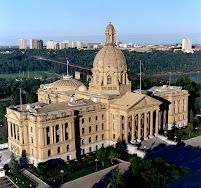 |
| Alberta Legislature building |
I enjoyed your post on changing the number of MPs (or MPPs/MLAs) and I think I largely agree. However, Alberta makes for an interesting counter-point.
Caucus discipline hasn't been particularly strong for some time here. Perhaps not as weak as in the UK, but not particularly strong either. When Jason Kenney came to power, he reportedly sought to emulate the British model and, again reportedly, wanted his caucus to be even more free than the normal Alberta way. We had a British model parliamentary democracy and so, he figured, we should emulate as many as possible of the elements of the way parties and governments run. So, he apparently welcomed even more free comment and dissent in caucus meetings, and it did him in for his pains.
The current UCP caucus appears, on the surface, to be more united, but there are lots of signs that it isn't as united as first glance (and a lack of people actually bad mouthing the Premier in public) might suggest. I don't think this is so much an Alberta thing as a way in which the rhetoric of right-wing parties here for the last decade has created a space for more dissent because there is a constantly a gap between public ideology and government in practice.
Interesting, and mostly new to me. Thanks!
While other parties certainly have their share of egomaniacal self-promoters, there may be something about a small-c conservative culture of respect for heroic individualism that has fostered dissent and defiance in the Conservative, Reform, UCP, and other parties. (See: Erin O'Toole)
As leader of the Reform Party, Preston Manning declared MPs should represent their constituents' views and not simply bring Ottawa's views back to the riding. But when Manning sensed serious opposition in his party, he tended to poll the party at large, asking in effect: Do you support me or do you want to leave the party? Until he lost one of those tests.
I wonder if Kenney's plan was similar: he could tolerate opinionated caucus members as long as the leader got to make party policy. It did not save his job in the end, but I think that's not enough accountability. If caucuses do not hold in reserve the power to remove their leader and choose the replacement, they remain mostly spectators in policy-making. That's the power that makes parliamentary democracy effective and accountable: not individual backbench dissenters, but the power of a caucus majority to overrule the leader. And that is the power no Canadian party tolerates.